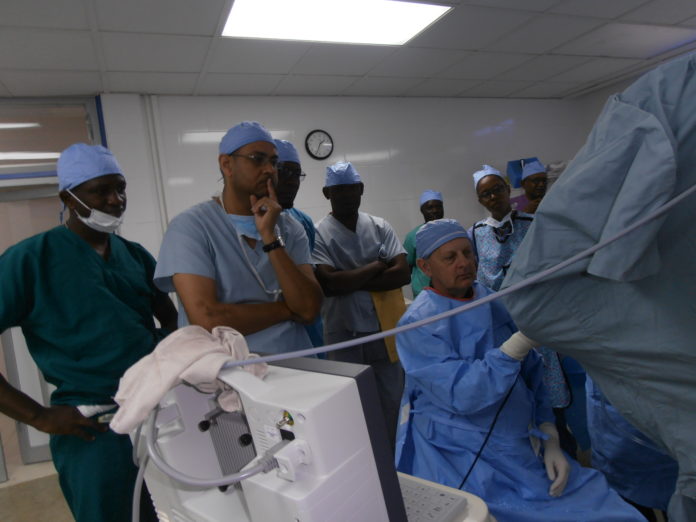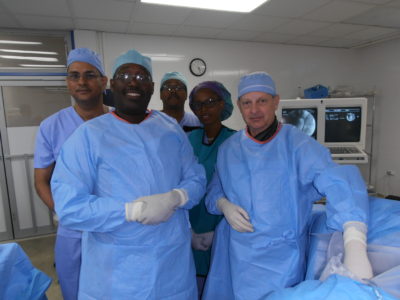
Lack of equipment, mid-surgery power outages and highly complex cases didn’t stop Dr. John Denstedt from imparting his wisdom to a clinical team in Haiti while performing the country’s first non-invasive kidney stone removal.
By Amanda Jackman
Even the most seasoned doctor would cringe at the sound of the power going down and watching your only imaging screen turn black during surgery, but St. Joseph’s own Dr. John Denstedt, urologist, kept his cool despite a week of endless challenges during a medical mission to Haiti.
Invited by Project Haiti, a non-profit organization dedicated to medical care and education, the surgeon spent seven days at St. Francis de Sales Hospital in the center of Port-au-Prince, one of several hospitals impacted by the magnitude seven earthquake in 2010.
“St. Francis was destroyed and has only been up and running for two years,” explains Dr. Denstedt. “The main city general hospital was leveled and is still not rebuilt. St. Francis is in the fortunate position to have a new building and operating rooms. The new structure is certainly a blessing for the medical staff that care for thousands of patients but one major difficulty continues to be lack of equipment. Most of what they use is second-hand as affordability is a significant issue.”
Teaching enthusiastic Haitian physicians non-invasive techniques, Dr. Denstedt skillfully operated on 16 people in need of care. “We just used what we had and made the best of it,” he says of the lacking medical equipment.
His efforts would galvanize and motivate the Haitian physicians, one remarking that Dr. Denstedt’s teachings “have revived us and created between us Haitian urologists a spirit of togetherness and team work that will help us get better faster.”
No stranger to the conditions of developing world hospitals, the Canadian-born physician has donated his time and expertise over the years to improve the practice of urology all over the world. Eastern Europe, Africa and China are among the beneficiaries of Dr. Denstedt’s skill and talent. Now Haiti has been added to his humanitarian and teaching dossier.
In Canada, percutaneous, or “keyhole” surgery has been performed for decades to remove kidney stones. In Haiti, however, invasive or “open” surgery was their only option, a practice long eliminated in developed countries.

“Minimally-invasive techniques are important for any country that does urological surgeries, “says Dr. Denstedt. “In North America 12 to 14 per cent of people will develop a kidney stone. In Haiti the occurrence is unknown but kidney stone incidence is rising across the globe.”
Spending almost all of his time in the operating room, Dr. Denstedt performed four ureteroscopies with lithotripsy (kidney stone fragmentation) and 12 percutaneous nephrolithotomies – the removal of a kidney stone through a keyhole incision. Included in the 12 was the country’s first kidney stone removal using a minimally-invasive method.
“The medical teams in Haiti have never been taught these procedures first hand. The goal of my time with them was to begin to introduce these techniques, work through their specific equipment and health care system challenges and have them utilize the techniques by using what they have,” says Dr. Denstedt. Some of the challenges that developed included power failures, missing equipment pieces, no access to a blood bank, no post-surgery intensive care units in case of complications, no X-ray technicians and limited adequate pre-operative imaging. The surgeon also spoke to his patients through a translator as the community’s predominant language is Creole.
Dr. Denstedt recognized the issues at-hand and understood he needed to have zero complications, all while teaching new techniques. “It was challenging but very well worth it. I taught several urologists who will help care for a population of 12 million. It’s a small start, but it’s something.”
Dr. Denstedt’s modesty is all but swept away by his colleagues in Haiti, one even referring to his masterful qualities.
“Thank you from the bottom of my heart for this exciting week of achievement that you brought to us,” says Dr. Bernard Brutus the local Chief of Urology. “Thanks to you we feel that we have made huge steps in learning of some of the newest technologies in the practice of urology in Haiti. Dr. Denstedt made a magistral demonstration of the beauty and art of the… management of renal and ureteral stones. We are deeply grateful for your commitment and good faith in what you are doing for our people.”
So renewed by Dr. Denstedt’s influence, the team is planning their own firsts with an exuberance they can barely contain.
“Today is a big day for me… I had a bilateral ureteral stone. I dusted both of them with the laser and I left two double J stents… After that I did a left ureteral stone with the laser… It was cool guys. I did those cases because of you,” said one of the newly trained doctors in an email to Dr. Denstedt and other colleagues.
“The people I met are good people trying hard,” says Dr. Denstedt. “They have a lot of commitment and are dedicated to doing the right thing – the best thing – for patients.”
To help ensure the mission was a success, Dr. Denstedt applied to the humanitarian arm of Cook Medical, which donated approximately $15,000 worth of medical equipment that remains in Haiti. And he didn’t stop there. The St. Joseph’s surgeon continues to be in touch with the group, answering questions through email and creating a “pathway forward” document to keep the hospital’s momentum going. With a plan to use televideo in the future, which would allow Dr. Denstedt to proctor into live surgeries in Haiti, he hopes to further guide their progress.
“I wanted to bring them a better and different way to perform these surgeries. Minimally-invasive surgery is a much safer way to care for patients.”
Safer indeed. The patient who underwent the country’s first removal of a kidney stone through a keyhole incision at the hands of Dr. Denstedt only spent two days in hospital. Typically in Haiti, the patient would have endured six to eight weeks of recovery.
“Coming back home helps me to really appreciate my practice here,” says Dr. Denstedt thoughtfully. “We have so much. But this is why it’s important to help other countries evolve and grow. It’s our role as Canadians to help where we can.”
Amanda Jackman is a Communication Consultant at St. Joseph’s Health Care London.

